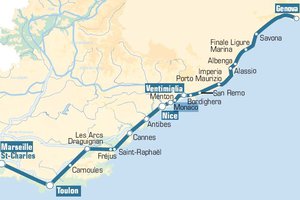News
Inforailmed, a project to develop rail services in the French-Italian-Monaco border area
January 2015
Every day, more than 12000 people take the train to cross the border between France, Italy and Monaco, whether for work or for leisure.
However, since 2009 and the arrival of competition in cross-border rail services, there are no longer trains that make the whole journey between the Provence Alpes Côte d’Azur Region and Liguria. All passengers are obliged to change trains in Ventimiglia, with the attendant consequences in terms of journey time and comfort.
The "Inforailmed" project, which is co-financed by the Alcotra programme, aims to improve these cross-border rail links. It brings together three main partners (Liguria, Monaco and the Provence Alpes Côte d’Azur Region) and comprises three components: the first aims to develop "passenger information", the second to improve services (notably by ending the enforced change of trains in Ventimiglia), while the third focuses on seeking a permanent framework for the governance and financing of cross-border rail services among the partners.
This project, which has benefited from substantial technical and legal input from the MOT, was completed in December 2014, with the first tangible operational results in terms of passenger information, coordination of services at the border and handling of situations of disruption.
In order to ensure the sustainability of the actions initiated, in December the three partners signed a declaration of intent to continue this cooperation, a first political act towards enhanced cooperation for the benefit of users.
The conclusions of the MOT's work, which was carried out through the whole of 2014, were presented in Monaco on 11 December. They related to the technical and legal solutions making it possible to implement the project's three components and recommended the creation of a European Grouping of Territorial Cooperation to bring together all of the competent partners in order to jointly manage the organisation of rail services.
Back to list
